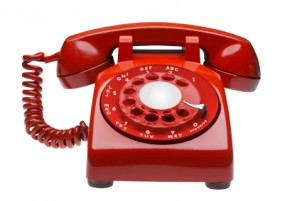 We’re all busy, so it’s tempting to whizz through your to-do list firing off emails and ‘getting things done’, but I encourage my third sector clients to take a break from the digital world every now and again, and make use of the old technology. Here’s why…
We’re all busy, so it’s tempting to whizz through your to-do list firing off emails and ‘getting things done’, but I encourage my third sector clients to take a break from the digital world every now and again, and make use of the old technology. Here’s why…
1. You really do get the job done. Just because I’ve sent an email or text doesn’t mean I’ve succeeded at doing anything at all. When you make a phone call to resolve an issue or deal with a challenge you can justifiably tick it off. You’ll get that great feeling that you’re moving forward and making a difference.
2. A phone call means you are in the now, dealing with what needs doing now. You’re not thinking about what has happened or worrying about what might happen. This is actually the most productive place to be.
3. You are in control. If there’s no answer, you ring again. You’re not waiting around for the other person to respond.
4. Creative, thoughtful solutions come out of real, personal relationships. Sending off a cluster of short, to-the-point emails on simple issues can save time. But when there is something more complex to discuss, you are far better just picking up the phone and engaging.
5. Talking to to a real, live person honours our basic human need to connect with others in a a way that text, email, Facebook or Twitter never can. Connecting with other people is proven to give us a greater sense of well being.
6. Talking to colleagues in your work place, or peers in other organisations, instead of sending an email, contributes towards a sense of shared purpose and responsibility and a feeling of belonging.
7. You show your leadership qualities. Emailing and texting are often tactics to avoid difficult conversations. When you take a deep breath, pick up the phone and deal with an issue that needs dealing with, you show what you are truly capable of. People will appreciate and respect you for it.
8. Phone calls are a great opportunity to practice pushing through your comfort zone. We have become less and less used to communicating one-to-one in real time. But what’s the worst thing that can happen? You don’t get what you want, the conversation was as difficult as you’d feared? You’ll handle it! And the more you do it, the easier it becomes.
9. It saves time. You know those emails that go backwards and forwards and you know you should just pick up a phone? Don’t get into them, or if you do, pull the plug after three emails and phone!
10. Using the phone avoids common misunderstandings around emotion and meaning that can happen in written communication. Real-time conversations allow an opportunity to express yourself, notice and respond to the other’s reaction – and most importantly of all, to really listen at a deep level. That can never happen in an email.
Coaching can help you and your staff communicate and use their time more effectively. If you would like to talk to Katie Duckworth about investing in you or in your third sector team please contact me here for a no-obligation chat.
This blog was inspired by a link in the latest ACEVO Third Sector newsletter on the power of phone and face-to-face meetings. See also Richard Branson’s new book Like a virgin: secrets they won’t teach you at business school.